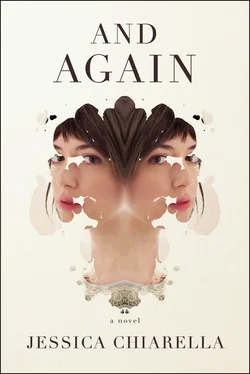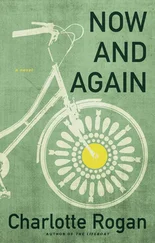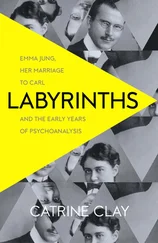“Penny’s the one with the interesting taste,” I told him later, lying in bed, watching the streetlight fracture through the sun catcher hanging from my window. Desperate not to seem childish, in my apartment filled with cheap, gaudy trappings. Desperate, already, to be a chameleon, to be the sort of girl who could fit seamlessly into his life. Because already I was in love with him.
“I like it,” he said, and it was the first time I realized I could tell when he was lying. He was no good at it. It was one of the things I loved most about him, that he was so honest he couldn’t even lie well.
When Sam moved in, I participated in each decision that undid that former home and created this one in its place. I helped Sam strip the floors, repaint the walls, spent endless weekends at Home Depot picking out track lighting and fabric swatches and high-tech dishwashers. I did not mind it then, being the one to change. Sam’s inherent goodness, his love of justice, his idealism, made me believe that loving him could make me all of those things, too. I realized that if one of us had to change so we could be together, it should be me.
None of it feels like it belongs to me now. I feel like an intruder here, standing in the middle of the living room with my coat on, afraid to dispel any of the room’s silent perfection with my presence. It’s as if the apartment has shifted a few degrees from where it was, skewing my sense of direction.
“Want me to make you something?” Sam asks, turning on the baseboard heaters to dispel the cold. He is constantly in motion because, after all, it would be silly for us both to stand, useless, in the middle of the room. It seems we don’t know how to live around each other anymore, after my months in the hospital. We lost the knack for it that quickly. “I haven’t really had the chance to get to the store these past couple of weeks, but I could make you some oatmeal.”
“Sure.” Oatmeal is one of the few foods I’ve been able to stand lately. Flavors are so strong they’ve become intolerable, and I’ve been subsisting on French fries and hospital Jell-O, applesauce and Honey Nut Cheerios. Peanut butter and jelly on white bread. Packets of cocoa. Children’s food. I haven’t been able to stomach meat either, since the transfer. From the moment the nurse put a tray of grayish Salisbury steak in front of me, I knew I wouldn’t be able to get it down. It had some new association with death for me, one I never considered before the transfer, and I still haven’t worked it all out yet. There is simply too much to figure out so soon.
The apartment looks recently cleaned, as if Sam removed all evidence of his weeks of living alone here while I was in the hospital. I can imagine what it must have looked like before, with discarded dirty socks on the living room floor and dark flecks of shaved whiskers in the bathroom sink. I know his bad habits, the lazy little traits that we both keep in check for each other. I don’t know what it would be like to live alone for months in this place. I’ve never lived alone, and that fact feels more significant now than it ever has.
I sit on the kitchen counter and watch as Sam cooks. It’s one of my favorite pastimes, watching Sam in the kitchen. He moves with a deliberate expertise balanced with a casual, practiced ease. He eyeballs the amount of milk he pours into the pot, chopping dried cherries as he waits for it to boil, then adds the oatmeal and stirs in a few shakes of cinnamon. It smells delicious. I sip weak tea that’s full of sugar and begin to feel warm again. Perhaps all we need is to keep busy, to not let the silence drag on for too long.
“I miss my tattoos,” I say, rubbing my wrist against the leg of my pants, as if I can unearth the design still hidden underneath my blank skin.
“Yeah, me too,” he says, holding up our nutmeg grinder. I shake my head, and he returns it to the cabinet.
“Liar,” I say. “What was it that you said when we first started dating? That I should consider what I’ll look like when I’m seventy?”
“I liked your tattoos,” Sam said, handing me a steaming bowl of oatmeal and a cup of brown sugar. I heap in a few heavy-handed spoonfuls.
He picks up my wrist and presses the blank skin of it to his mouth. There’s potential in this moment, the first time we’ve touched outside the hospital, in an apartment with a locked door and no chance of anyone banging in to draw my blood or clear my tray of food or test my memory. All of my nerve endings seem to rush to the surface of my skin, crackling with the electric potential to feel. An image of David comes forward, unbidden, the way he squinted against the sun before I kissed him on the roof. And then Sam is stepping back, looking as if he’s shaking off an ill-conceived impulse. He clears his throat and scratches at the nape of his neck, where his hair is just a bit too long.
“Do you think you’ll have them redone?” he asks, picking up the pot and rinsing it out in the sink. Keeping busy so he won’t have to look directly at me.
“What?”
“Your tattoos.”
“No,” I say, my voice too sharp, trying to turn my attention back to my breakfast, trying to ignore my own ill-conceived impulse, to throw my bowl and its steaming contents in his direction. All he has for me is kindness and pity, and I want neither. The brown sugar melts into my oatmeal, and I eat a few hot mouthfuls to distract myself before I continue.
“It wouldn’t be authentic, if I just got them all over again. I wouldn’t be getting them for the same reasons. They wouldn’t mean what they used to.”
“Right,” Sam says, as if he understands. He acts as if he understands all of it, the bits of me that I’ve never quite been able to smooth out, the pieces that I never quite managed to fit into this life of ours. But the truth is, he never has.

Sam and I met for the second time during my fourth year at the School of the Art Institute. It was at a gallery in River North, during a posh up-and-coming event where my friend Trevor was showing one of his paintings. I had always liked Trevor’s work. He had a modern Egon Schiele thing going on, and I’d sat for him a couple of times when he wasn’t happy with his other models. Trevor said he always preferred to paint other artists anyway; he had a theory that painting another artist watching him created a double-mirror effect, opening a corridor of space that hadn’t existed in his work before. Of course, he would have had to pay one of the gamine young women who posted fliers on the SAIC bulletin board, whereas for a while I was willing to take my clothes off for him for free.
There must have been something to his theory, though, because it was one of his paintings of me that had created enough of a stir to get him into the show. I dragged Penny with me that night, unwilling to venture into a gathering of North Shore art collectors by myself. We tottered in on stiletto heels, looking like a pair of lost hippies in thrift-store cocktail dresses. The painting, of course, was on its own wall, seven feet tall and vibrant with color, me in purple knee socks and nothing else, lying on rumpled sheets and walking my feet up Trevor’s bedroom wall. My eyes peered right at the observer. Looking at it made me a bit dizzy, seeing myself the way he’d seen me in his head, all swirls of color and those huge, demanding eyes. It made me wonder if all my mirrors had been lying to me my whole life, though I couldn’t exactly decipher the nature of the lie. I couldn’t tell if I was more beautiful or less, the way he’d painted me.
Penny, of course, was unimpressed. “In the future, please make sure the men who see you naked know how to use a paintbrush,” she said.
Читать дальше













